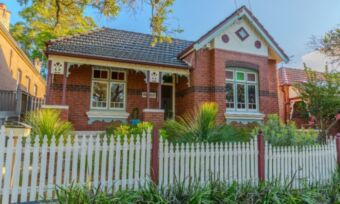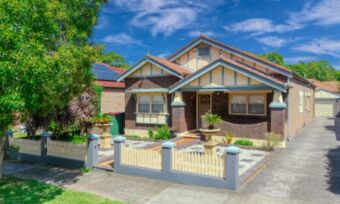How much does bamboo flooring installation cost?

If you are searching for a durable, versatile alternative to traditional hardwood flooring, then bamboo may be worth considering. You may be wondering – what does bamboo flooring cost? Here, we run through some of the basics of what you might expect to pay, as well as some things to keep in mind.
Bamboo is a versatile tree-like grass (yep, bamboo is technically a grass) can be used in a multitude of ways. According to Australian-based business Bamboo Land Nursery & Parklands, these can include the production of paper and clothing, medicines, and building and landscaping materials. Not to mention too: it is also the staple food of the giant panda.
Bamboo is becoming an increasingly popular flooring material in Australia due to its fast-growing nature and plentiful supply, as well as its overall strength and durability. In light of this, you may be wondering, how is this ‘grass’ made into a floorboard? What costs are involved? And what are some of the pros and cons of using this material for your floors? Let’s lay it out, one floorboard at a time.
How much does bamboo flooring cost?
Trade listings website hipages says that on average, you might expect it to cost around $80 – $90 per m2, but that the price depends on the quantity you buy, and can come down if you purchase larger quantities. For example, they say that if you buy up to 30 sqm of standard grade bamboo flooring, it might cost approximately $55/sqm, but for 250 sqm or more, the cost could fall to $45/sqm.
It is important to note that this is the approximate materials cost, and does not include the cost of installation. The cost of installation can vary, but they advise that when you get quotes for labour, you find out exactly what’s included – for example, whether the price includes any underlay you might require, as well as the cost of jobs like removing and replacing skirting boards, or whether this will be extra.
Factors that may influence the price of bamboo flooring can include the quality of the flooring, such as how and where it was manufactured, as well as the design of the floorboards.
How is bamboo flooring made?
The Australasian Timber Flooring Association (ATFA) says bamboo flooring is manufactured from strands of bamboo that are glued together with adhesive and then cut and made into floorboards by a machine. This is known as strand-woven bamboo.
Bamboo flooring can also be made by laminating small pieces either vertically or horizontally, and engineered bamboo flooring which usually consists of several layers of wood (such as plywood) and a top layer of bamboo, bonded together with adhesives.
ATFA states that by the time it gets to the consumer, most bamboo flooring comes pre-finished. This includes staining, which means you won’t typically have to wear this additional cost after the bamboo floor has been laid.
How is bamboo flooring installed?
Most bamboo floors are installed as a floated floor over an underlay. This means that the boards are fixed to each other, but not fixed to the ground. Alternatively, floorboards can be fixed with adhesive to an underlayer made of particleboard and plywood.
Simply Bamboo, an Australian business, said that in an average 100m2 home, it can take approximately three to four days to install a bamboo floor via the fixed method, or two to three days to install one via the floating floor method. The exact time to install can ultimately depend on the method of installation, the layout of the design and if there are any obstructions, such as a staircase.
How much does bamboo flooring installation cost?
According to hipages, professional installers on average charge around $80 to $90 per square metre to lay bamboo flooring. This covers the costs of preparing the ground surface (that may involve removing any existing flooring), installing an underlay layer, removing and replacing skirting boards and laying the floorboards.
Installation prices can vary widely depending on the contractor chosen to do the work and the location, as well as how the floors are installed (floated floor or fixed) and the type of underlay.
As with any major investment in your home, it’s a good idea to get several quotes from professional installers and carefully compare the products, services and warranties, as well as the costs, before choosing one. ATFA can put you in touch with accredited installers and manufacturers.
What are some of the pros and cons of bamboo flooring?
There are various benefits and potential drawbacks when it comes to using bamboo flooring. While it can be hard-wearing and is sustainable, easy to clean and available with different colours and finishes, bamboo floors are also prone to movement, can scratch easily and may release small amounts of volatile organic compounds (VOCs).
Pros
1. Hard-wearing:
Strength and durability are positive features of bamboo flooring. Flooring specialist Arrow Sun says natural, un-carbonised bamboo that has been properly harvested and manufactured can be as durable as red oak, and strand-woven bamboo can be manufactured even harder than that. However, it’s important to note that not all bamboo flooring is made equal, so it may be a good idea to consider a supplier who can provide a substantial warranty.
2. Interesting colours and forms
Bamboo flooring can come in a variety of styles, colours and finishes according to build.com.au, and can have a very similar appearance to hardwood floorboards.
3. Easy to clean
Arrow Sun states that bamboo is relatively easy to maintain and recommends home owners sweep or vacuum it regularly and use a damp mop with a non-wax, non-alkaline, hardwood or specialised bamboo floor cleaner.
4. Sustainable to produce
According to build.com.au, one of the advantages of bamboo over hardwood flooring is that it grows extremely quickly – in some cases up to a metre in a single day. It reported that bamboo can typically be harvested when it is between four and seven years old, with the crop continuing to produce usable material from that time onward, making it a rapidly renewable resource. Hardwood trees, on the other hand, are likely to take at least 15 years to reach ‘maturity’ and once they do, they typically only offer a one-time yield of timber.
Cons
1. Prone to movement
Arrow Sun says that while bamboo is reasonably water resistant, it’s still an organic material, and too much moisture can cause warping. This makes it important to aim to keep bamboo floors dry and free from excessive moisture.
2. Can scratch easily
While bamboo flooring is generally hard-wearing and easy to maintain, lower-quality bamboo can be prone to scratching, such as from high heels, pet claws and furniture legs, according to Arrow Sun. Bamboofloors.com.au said that bamboo floors can be sanded multiple times, however, with refinishing over the longer term.
3. Potential VOC emissions
Some bamboo floorboards can be manufactured using adhesive (formaldehyde-containing glues). These may release small amounts of volatile organic compounds (or VOCs) into the air over time, especially when the flooring is new, according to build.com.au. The level of adhesive used and the number of VOCs emitted will vary depending on how the boards were manufactured. Some VOC emissions may lead to poor indoor air quality which, according to the Australian Government website Your Home, can produce a range of health effects from headaches and tiredness, to an aggravation of asthma and allergic responses
Consumer group Choice says most bamboo floorboards in Australia use low-emission glues, but recommends doing your research to be sure.
Compare Home Loans (Refinance with variable rate only) with Canstar
If you’re currently considering a home loan, the comparison table below displays some of the variable rate home loans on our database with links to lenders’ websites that are available for homeowners looking to refinance. This table is sorted by Star Rating (highest to lowest), followed by comparison rate (lowest to highest). Products shown are principal and interest home loans available for a loan amount of $500,000 in NSW with an LVR of 80% of the property value. Consider the Target Market Determination (TMD) before making a purchase decision. Contact the product issuer directly for a copy of the TMD. Use Canstar’s home loans comparison selector to view a wider range of home loan products. Canstar may earn a fee for referrals.
The comparison rate for all home loans and loans secured against real property are based on secured credit of $150,000 and a term of 25 years.
^WARNING: This comparison rate is true only for the examples given and may not include all fees and charges. Different terms, fees or other loan amounts might result in a different comparison rate.
 Owner occupied
Owner occupied
 20% min deposit
20% min deposit
 Redraw facility
Redraw facility
 Owner occupied
Owner occupied
 10% min deposit
10% min deposit
 Redraw facility
Redraw facility
 Owner occupied
Owner occupied
 20% min deposit
20% min deposit
 Redraw facility
Redraw facility
 Owner occupied
Owner occupied
 20% min deposit
20% min deposit
 Redraw facility
Redraw facility
 Owner occupied
Owner occupied
 20% min deposit
20% min deposit
 Redraw facility
Redraw facility
Canstar is an information provider and in giving you product information Canstar is not making any suggestion or recommendation about a particular product. If you decide to apply for a home loan, you will deal directly with a financial institution, not with Canstar. Rates and product information should be confirmed with the relevant financial institution. Home Loans in the table include only products that are available for somebody borrowing 80% of the total loan amount. For product information, read our detailed disclosure, important notes and additional information. *Read the comparison rate warning. The results do not include all providers and may not compare all the features available to you.
Home Loan products displayed above that are not “Sponsored or Promoted” are sorted as referenced in the introductory text followed by Star Rating, then lowest Comparison Rate, then alphabetically by company. Canstar may receive a fee for referral of leads from these products.
When you click on the button marked “Enquire” (or similar) Canstar will direct your enquiry to a third party mortgage broker. If you decide to find out more or apply for a home loan, you can provide your details to the broker. You will liaise directly with the broker and not with Canstar. When you click on a button marked “More details” (or similar), Canstar will direct your enquiry to the product provider. Canstar may earn a fee for referral of leads from the comparison table above. See How We Get Paid for further information.
Main image source: SeaRick1/Shutterstock.com
This article was reviewed by our Editor-in-Chief Nina Tovey before it was updated, as part of our fact-checking process.

Alasdair Duncan is Canstar's Deputy Finance Editor, specialising in home loans, property and lifestyle topics. He has written more than 500 articles for Canstar and his work is widely referenced by other publishers and media outlets, including Yahoo Finance, The New Daily, The Motley Fool and Sky News. He has featured as a guest author for property website homely.com.au.
In his more than 15 years working in the media, Alasdair has written for a broad range of publications. Before joining Canstar, he was a News Editor at Pedestrian.TV, part of Australia’s leading youth media group. His work has also appeared on ABC News, Junkee, Rolling Stone, Kotaku, the Sydney Star Observer and The Brag. He has a Bachelor of Laws (Honours) and a Bachelor of Arts with a major in Journalism from the University of Queensland.
When he is not writing about finance for Canstar, Alasdair can probably be found at the beach with his two dogs or listening to podcasts about pop music. You can follow Alasdair on LinkedIn.
The comparison rate for all home loans and loans secured against real property are based on secured credit of $150,000 and a term of 25 years.
^WARNING: This comparison rate is true only for the examples given and may not include all fees and charges. Different terms, fees or other loan amounts might result in a different comparison rate.
 Owner occupied
Owner occupied
 50% min deposit
50% min deposit
 Redraw facility
Redraw facility
Try our Home Loans comparison tool to instantly compare Canstar expert rated options.






